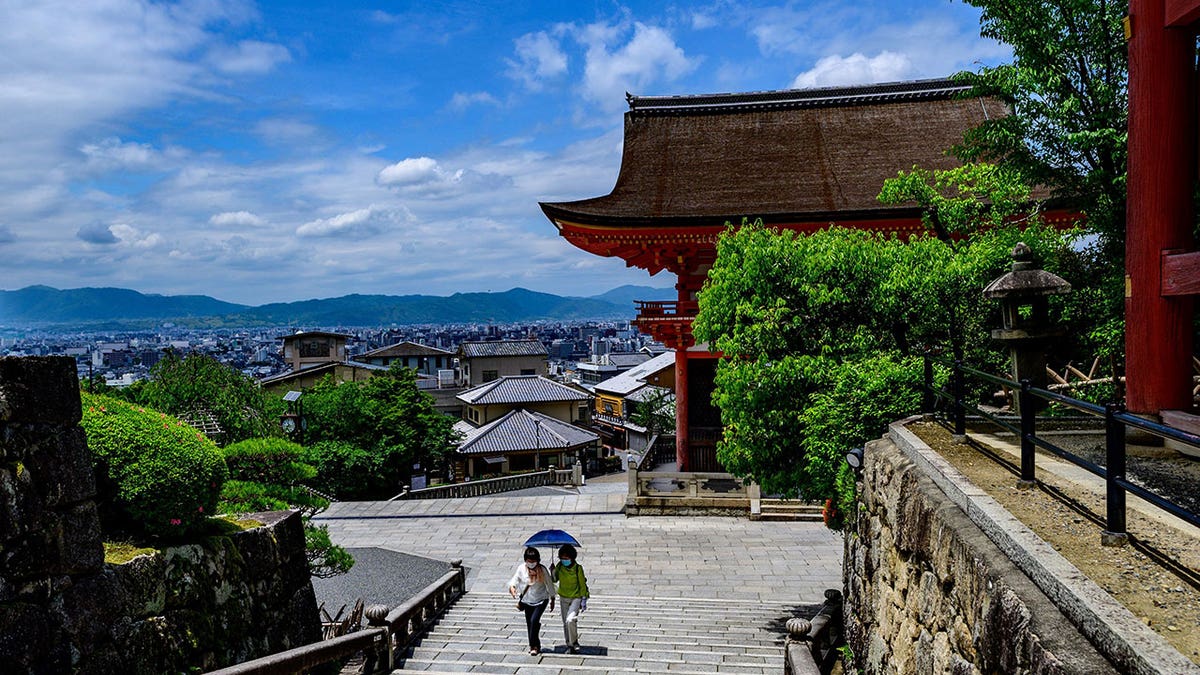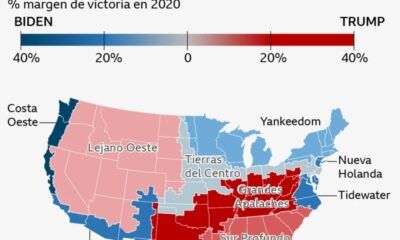INTERNACIONAL
Japan’s ancient capital Kyoto, a popular travel destination, implements tourist ban in famous district

- Kyoto, a popular travel destination in Japan, will now restrict tourist access to parts of its renowned geisha district.
- Officials have reported an increase in complaints regarding tourist misbehavior and street overcrowding.
- Overseas tourist traffic to Japan is rebounding to pre-pandemic levels.
Japan’s ancient capital of Kyoto, long a popular destination for tourists, is closing off some private-property alleys in its famous geisha district because of complaints about misbehaving visitors.
Tourists crowd the narrow, quaint streets of the area called Gion, often following tour guides who show people around and lecture for long hours, local district official Isokazu Ota said Friday.
«We are going to put up signs in April that tell tourists to stay out of our private streets,» he told The Associated Press.
JAPAN SENTENCES MAN TO DEATH FOR KYOTO ANIMATION STUDIO FIRE THAT KILLED 36 PEOPLE, INJURED DOZENS
A sign will say in both Japanese and English: «This is a private road, so you are not allowed to drive through it,» although the keep-out warning is aimed mainly at pedestrians, not cars, as the Japanese wording refers to generically «passing through.»

Visitors are seen at Kiyomizu temple, a wooden structure set in the hills around Kyoto. Kyoto, long a popular destination for tourists, is closing off some private-property alleys in its famous geisha district because of complaints about misbehaving visitors. (PHILIP FONG/AFP via Getty Images)
«There will be a fine of 10,000 yen,» the sign adds, which comes to about $70 under recent currency conversion rates.
The ban covers just several blocks of Gion. The district’s public streets will remain open to tourists, so the area and the rest of Kyoto will still be teeming with visitors, both from Japan and around the world.
Gion’s outrage highlights brewing resentment at what many people feel is «over-tourism,» even though the Japanese economy depends more than ever on tourism revenue to sustain growth.
The district of winding alleyways is known for picturesque teahouses, where geisha and their maiko apprentices, wearing fancy kimono and hair ornaments, perform in dance and music.
US AND JAPAN CALL FOR BAN OF NUCLEAR WEAPONS IN OUTER SPACE
In a city known for gorgeous temples and gardens, Gion is one of its most scenic and historical spots. Tourists, armed with cameras, like to wander around Gion, hoping to catch the women on their way to dance class or a fancy dinner party.
Complaints about over-zealous tourists began bubbling years ago, though the discontent cooled when the coronavirus pandemic brought a lull in tourism. Now, visitors are back with a frenzy.
Overseas tourist traffic to Japan is rebounding to pre-pandemic levels.
More than 22 million visitors came to Japan last year, eager to take in sushi, electronic gadgetry and the splendors of nature like Mount Fuji and the beaches of Okinawa. In 2019, incoming travel totaled more than 31 million people, and this year’s number could approach or even overtake that, experts say.
It’s been too much for many residents of Gion. Their local council summarized the less than eager sentiments a few months ago by proclaiming: «Kyoto is not a theme park.»
INTERNACIONAL
Two US Navy pilots shot down over Red Sea in apparent ‘friendly fire’ incident: US military

Two U.S. Navy pilots were shot down Sunday over the Red Sea in what appeared to be «friendly fire», the U.S. military said.
The pilots were found alive after they ejected from their aircraft, with one suffering minor injuries.
The incident demonstrates the pervasive dangers in the Red Sea corridor amid ongoing attacks on shipping by the Iranian-backed Houthis, even as U.S. and European military coalitions patrol the area.
The U.S. military had conducted airstrikes targeting Yemen’s Houthi rebels at the time, but U.S. Central Command did not elaborate on what their mission was.
US NAVY SHIPS REPEL ATTACK FROM HOUTHIS IN GULF OF ADEN
A fighter jet maneuvers on the deck of the USS Dwight D. Eisenhower in the Red Sea, June 11, 2024. (AP)
The military said the aircraft shot down was a two-seat F/A-18 Super Hornet fighter jet assigned to the «Red Rippers» of Strike Fighter Squadron 11 out of Naval Air Station Oceana, Virginia.
The F/A-18 shot down had just flown off the deck of the USS Harry S. Truman aircraft carrier, according to Central Command. On Dec. 15, Central Command said the Truman had entered the Mideast, but did not specify that the carrier and its battle group were in the Red Sea.
«The guided missile cruiser USS Gettysburg, which is part of the USS Harry S. Truman Carrier Strike Group, mistakenly fired on and hit the F/A-18,» Central Command said in a statement.
It is unclear how the Gettysburg had mistaked an F/A-18 for an enemy aircraft or missile, particularly since ships in a battle group are linked by radar and radio communication.
US MILITARY CONDUCTS SUCCESSFUL AIRSTRIKES ON HOUTHI REBEL FORCES IN YEMEN

The Ticonderoga-class guided-missile cruiser USS Gettysburg (CG 64) steams in the Mediterranean Sea, Dec. 15, 2024. (AP)
Central Command said that warships and aircraft earlier shot down multiple Houthi drones and an anti-ship cruise missile launched by the rebels. Fire from the Houthis has previously forced sailors to make decisions in seconds.
The U.S., since the Truman arrived, has ramped up its airstrikes targeting the Houthis and their missile fire into the Red Sea and the surrounding area. But an American warship group in the region may lead to additional attacks from the rebels.
On Saturday night and into Sunday, U.S. warplanes conducted airstrikes that shook Yemen’s capital of Sanaa, which the Houthis have held for a decade. Central Command said the strikes targeted a «missile storage facility» and a «command-and-control facility.»
Houthi-controlled media reported strikes in both Sanaa and around the port city of Hodeida, but did not disclose details on any casualties or damage.

Aircraft carrier USS Harry S. Truman is moored near Split, Croatia, Feb. 14, 2022. (AP)
CLICK HERE TO GET THE FOX NEWS APP
The Houthis later acknowledged the aircraft being shot down in the Red Sea.
Since the start of the Israel-Hamas war in October of last year, the Houthis have targeted about 100 merchant vessels with missiles and drones.
The rebels say that they target ships linked to Israel, the U.S. or the U.K. to force an end to Israel’s war against Hamas in Gaza, which began after Hamas’ surprise attack against Israel on Oct. 7, 2023, although many of the ships the rebels have attacked have little or no connection to the ongoing war, including some headed for Iran.
The Houthis also have increasingly targeted Israel with drones and missiles, leading to retaliatory airstrikes from Israeli forces.
The Associated Press contributed to this report.
-
POLITICA2 días ago
Patricia Bullrich le respondió a Victoria Villarruel tras las críticas por el gendarme detenido en Venezuela
-
POLITICA2 días ago
El descargo de Longobardi tras su salida de Radio Rivadavia: «Me hizo acordar cuando Cristina ejecutó mi despido en Radio 10»
-
POLITICA3 días ago
La Corte Suprema declaró inconstitucional la reelección indefinida en Formosa
-
INTERNACIONAL1 día ago
Atropello múltiple en un mercado de Navidad en Alemania: al menos dos muertos y más de 60 heridos
-
POLITICA1 día ago
Guillermo Castello: «Kicillof está utilizando la caja de la provincia para posicionarse políticamente»
-
POLITICA9 horas ago
Nisman: el Gobierno acepta el pedido del fiscal y levanta el secreto sobre los espías inorgánicos de la SIDE y el Ejército








































